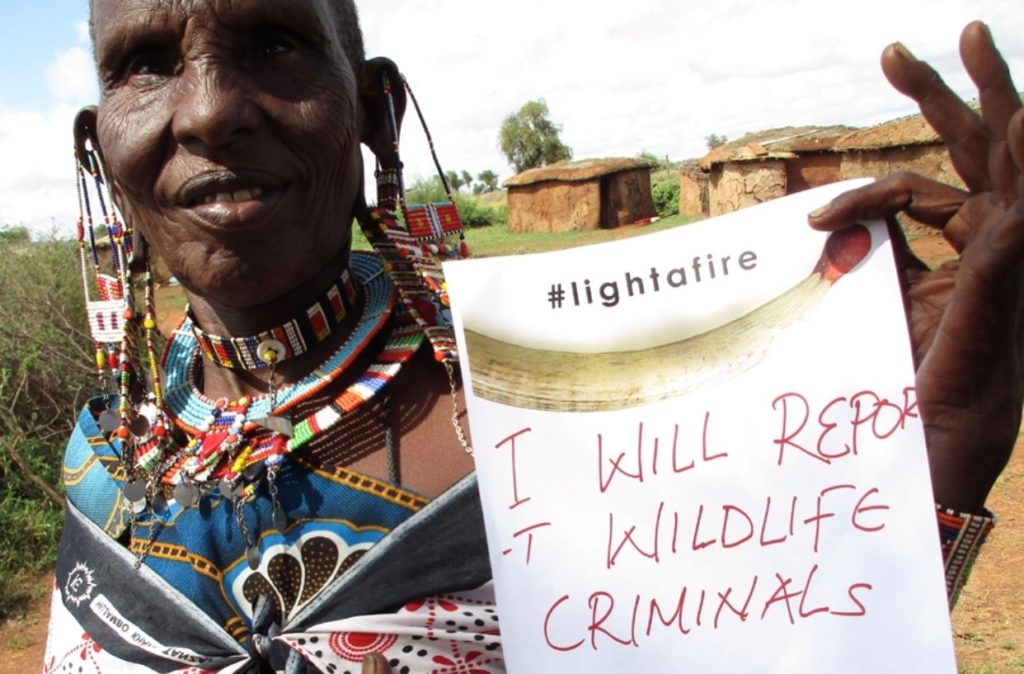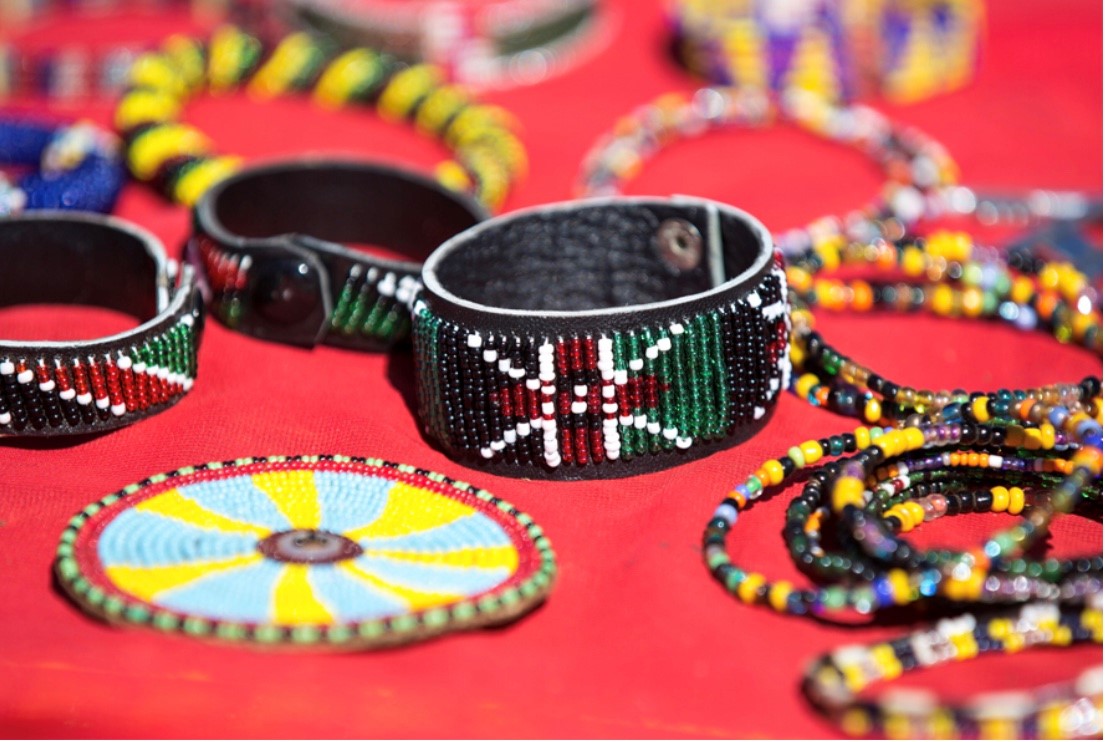To call Dr. Paula Kahumbu a strong woman, would be a masterpiece of understatement. From the time she was a teenager living in Kenya, she made the choice to live her life on her own terms. Under no circumstance was she going to become a secretary, and be confined to the traditional expectations of a typical Kenyan woman of that time. No, she had other plans for herself. Bitten by her love of the environment and conservation at a young age while surrounded by wildlife living in a rural area of Kenya, she knew her path was going to be wider and she trail blazed it with vision and determination like notables Diane Fosse and Jane Goodall.
With her boots on the ground effort, Dr. Kahumbu made her way to a Kenyan park lead by conservationist and paleoanthropologist, Dr. Richard Leakey (son of famed paleoanthropologist Dr. Louis Leakey), whom became her mentor, helping to sculpt and affect the change she would make in continuing his legacy.
Now with a PhD from Princeton University where she studied Ecology and Evolutionary Biology, she is the CEO of Kenyan Conservation NGO (originally co-founded by Richard Leakey) and is now championing the hard-hitting Hands Off Our Elephants Campaign with First Lady Margaret Kenyatta. Hands Off Our Elephants is a campaign to help build elephant awareness and conservation via behavior change on every level of society, from rural communities, to business leaders and politicians.
Now, being an environmental myself, feeling heartbroken over the poaching crisis of the African elephants and having a lifelong admiration for Fossey and Goodall, when Fashion for Conservation asked me to interview Paula Kahumbu for their Elephantasia campaign, I jumped at the chance!
I arrived at the office in New York and was immediately escorted to a conference room lined with a collection of Amarula Liqueur bottles, and was introduced to Dr. Kahumbu. She shook my hand with a warm, welcoming smile on her face as we sat down to discuss the Maasai people’s beadwork she had brought for me for a Fashion for Conservation shoot, the plight of the elephants and how others are working to raise awareness for these endangered giants.
Dr. Kahumbu: So these are traditional African pieces made by women of the Maasai Tribe who are master beaders. These women in particular are the women we are trying to support. Each of these pieces are mostly worn together. They are given to women by men.
GYPSETGIRL: Wow, these are extraordinary! So, tell me why you are here in New York.
Dr. Kahumbu: I am here working on a partnership with Amarula who supports the Maasai women.
GYPSETGIRL: I see, hence the many Amarula bottles. (I point to the line of bottles across from me)
Dr. Kahumbu: Yes, it’s a cream made from the Marula fruit which is a very famous and iconic tree in Africa that elephants love, and when the tree blooms, it produces buckets of these fruit. They fall on the ground and release this beautiful smell that attracts elephants from all around who come an eat the fruits and disperse them again through their travels. So the tree and the elephants are interlinked.
GYPSETGIRL: That’s such an interesting way to look at it. Unfortunately, I imagine the poachers take advantage of the opportunity of the elephants love of visiting the trees and eating from it?
Dr. Kahumbu: Yes, the poachers take advantage of any opportunity. Clearly though, it’s not the trees fault, but the people who are in the market for the ivory.
GYPSETGIRL: Yes I understand that. Do you think it comes down to a lack of education?
Dr. Kahumbu: Not necessarily, did you know that New York is one of the biggest markets for ivory in the world? And so is Washington. There are Americans that are highly educated who don’t know that every piece of ivory that you wear has resulted in an elephant being killed. When an elephant gets killed, it’s not just an elephant like any other animal, these are animals that have societies, cultures and families just like human beings. They grieve, they mourn. When poachers kill an elephant, they always go for the biggest, so you’re talking about the matriarchs, they are the older individuals in the families which stay together for life. So when you remove those wise elder individuals, you’re left with baby orphans who cause a lot of problems and are then killed even further because of their nuisance. So it really disrupts the entire planet and society which causes a lot of tension and trauma, which one could really relate to as a human being. It’s like a war. It’s like families who are disrupted by war. This is what is happening in lots of parts of Africa. In Southern Tanzania alone they’ve lost 75% of their elephants. So you can imagine what that means. It means that every family of elephants that lives in Tanzania is affected by the poaching crisis that’s going on.
GYPSETGIRL: It’s heartbreaking to hear that. I’ve always had an affinity with Africa since I was a small child. Africa has had a big influence on shaping my passion for animal conservation, and I understand that elephants have the same feeling as humans, so as a result, what is happening really enrages me.
Dr. Kahumbu: It’s very tragic. People around the world love elephants. We see them in our toys, we see them in our bed sheets, we see them on television. They’re everywhere. Elephants are one of the most beloved species on this planet and very few people know they are being killed. One every fifteen minutes, which literally means in our lifetimes, by 2030 they will be gone from the wild. We are trying to change that course by supporting education like this because there isn’t enough awareness.
Dr. Kahumbu: The campaign we are running is called “Don’t Let Them Disappear” We built a life-size elephant sculpture, meaning it was about 10 ft. Tall, in Union Square this past August 12th, which is World Elephant Day. It weighed the same as a huge elephant. It’s was created by a very famous Japanese sculptor, and we let it stand in the summer sun and melt as a symbol of the elephants disappearing. We have from this gotten a massive public engagement, because we invited people from New York and beyond to come see and engage with us, talk to me, learn more about the problem and learn more about how they can help. Actually, the other thing Amarula has done is from every bottle of liqueur sold in the US from the first of September until the end of the year, they will donate $1.00 to WildlifeDirect, so we can continue our work in Kenya.
GYPSETGIRL: What an original and thoughtful way to spread awareness!
GYPSETGIRL: I truly admire the work you have done with WildlifeDirect, tell me how you’ve made conservation your lively hood? Was there a catalyst or something that happened where you said “I have to do this”?
Dr. Kahumbu: I think, like many Kenyan’s, I grew up surrounded by wildlife in a very rural area. Which I still live around today. Kenya is my home. I live just south of the Nairobi National Park, just outside of, the wilderness area. I decided as a teenager that I was going to do conservation.
GYPSETGIRL: But a Park Ranger is quite a demanding job. What was it that drew you in to tackle that challenge?
Dr. Kahumbu: My mother! She wanted me to be a secretary. I was sent off to secretarial college like so many girls my age in that area. After three months there, my girlfriend and I were dying and we decided we were going to run away. We got on a bus which was unheard of for us and we went to the National Museums of Kenya to listen to the scientific lectures and then I decided then and there, that’s it! I want to be a ranger. I want to go out there and protect lions. I went off to talk to Richard Leakey who was in charge of that particular park. He was incredibly generous in that he listened to me, a seventeen-year-old with no university experience. He said, “Are you sure you want to be a ranger?” He looked at my grades and said he would help me get the job. I was encouraged and mentored from then on. I was given all these opportunities to go into these wild places and work with wild animals, other scientists and experts. It was that which really helped me to understand sort of what it would be like to be a ranger and what it would be like to be a scientist. So I decided I wanted to do conservation. You cannot really have any power or say unless you have the academic credentials, which is why I went to university to get my bachelors degree, my masters and finally my PhD here in the US at Princeton.
GYPSETGIRL: That’s so impressive! When did you become CEO of WildlifeDirect? How did that occur?
Dr. Kahumbu: My entire career was aimed towards working with the national government for the Kenya Wildlife Service and after working for them for two years, I realized I was not making the impact I wanted to make. So I left the wildlife service in 2007 without knowing what I could do and Richard Leakey invited me come and work for WildlifeDirect, which was an organization at the time that created a voice for people doing conservation, on the ground and all across Africa. I left the job I was doing, which was considered a great job in terms of money and prestige, to go back to work for Richard Leakey and it was phenomenal. I was creating campaigns to help not only raise awareness about the crisis of the African animals but make a real difference for them. I became the CEO in 2009 and I’ve been there ever since.
GYPSETGIRL: What a remarkable impact you’ve had!
GYPSETGIRL: I’d like to get back to the beadwork. The Oltome-Nadupo Womans Company is such an amazing vehicle to build awareness for the plight of the elephants and proving, as you were saying, that elephants can coexist with people. This is so important for people to know, in addition to it empowering the Maasai women that you’re working with. How did the organization begin and what parts have you helped to contribute to its success?
Dr. Kahumbu: So first, it’s really important that people know that African elephants and humanity evolved together. In fact, I think people love elephants because we literally have related to each other since the beginning of man kind, so it’s tattooed on our DNA that we have this relationship. Communities in Africa have lived with elephants forever. In fact, it’s amazing that the mammoths went extinct. In America, humans did not evolve with mammoths, they killed them off. In Africa, humans lived along side mammoths. In this particular community, in Maasai Land, women are not really empowered. It’s a very patriarchal society, and these women worked with us initially as an empowerment project to train them in whatever they wanted to be trained in that would allow them the empowerment they needed to have a greater say in their lives and future. In particularly in an alternative lively hood. They said they wanted to do beadwork and they wanted the name of their company to be related to elephants, so they named it Oltome-Nadupo, which means elephant success story. So this is why it’s so important, 147 women, many of them in their sixties, none of which have ever gone to school, so they can’t read or write created this company. In spite of the obstacles they faced, they really wanted to have a business of their own, which was a huge challenge for us, but they wanted to have a say. Empowerment for them meant financial independence. They aren’t allowed to own cattle or land, but they have a craft that is unique to them and the quality of their work is world-class. So in realizing this we said, “How can we turn their products into more than just tourism trinkets, and into something that has global appeal, and gives real value?” It’s art, what they produce, it’s really world-class art. For these women it’s jewelry they actually wear every day. A lot of people think they put it on for tourists and they don’t. They actually wear it all the time. They have all kinds of amazing folk-lore, cultural legends and stories about what each color means and their association of the different stories. It is related to their lively hoods and related to their livestock as well, which is a critical part of their survival and their status in society. Every piece is made by a woman, to then be given to another woman for a certain reason. Each piece is meaningful and authentic. You can actually smell within the pieces, the Maasai Home.
So to turn these products into something sellable on a global platform, we built a workshop and supplied these women with the highest quality materials to create the production and successfully target a fashion sector that is interested. The reason why this is so important for elephants is because ivory is also a fashion accessory. If it’s in fashion they can say don’t buy ivory, buy our traditional beadwork. It supports the women who create them and provides income so their lives can continue, which will ensure the elephants lives will continue. We don’t want these people to end up having to kill elephants out of desperation for income. In many other local communities, the people are killing elephants because they have no other means of generating income.
So here’s an opportunity for women to remain champions, to be whistleblowers when they see things going wrong, to defend elephants, and to engage with their community on conservation and protecting them.
GYPSETGIRL: How do the men of the communities feel about this new empowerment of women?
Dr. Kahumbu: The men have been extremely supportive!
GYPSETGIRL: That’s really special, I love to hear that.
GYPSETGIRL: So as you know, it’s challenging for many people to feel they can make real change. In that situation, what would be your advice for others to understand how they can feel confident that they are affecting change in their effort to raise awareness for the elephant crisis?
Dr. Kahumbu: The best evidence is when people who get involved see communities come together in all sectors. We have commercial brands partnering with NGO’s. Also, we are working with the government. As a result of these collaborations and joint efforts of many organizations, people on the ground and the media, poaching in Kenya has declined by 80%. So not only are the populations in Kenya safe, but they are growing. The giant tusked populations have also maintained a steady presence. Meaning that when people support the conservation, these giant tusked breeds can pass their powerful genetics down to their offspring. Thus proving the positive effects. The government has been a huge help. They don’t give us money, but what they give us is tremendous support. They give us platforms, attend our events, support us by giving us the ability to do all kinds of things. We have the first lady literally coming to the field. It was actually her research that sparked this project with the Maasai women in collaboration with saving elephants.
GYPSETGIRL: This is amazing, it’s so important for women to be able to come together and create a community of sisterhood.
GYPSETGIRL: It’s been such an education sitting here with you and learning so much about the plight of the African elephants. I thank you for that. Now, on a lighter note, I’d like to ask you a few specific questions I ask all of the well-traveled people I interview for GYPSETGIRL.
Dr. Kahumbu: Ask away!
GYPSETGIRL: Ok. What does travel mean to you?
Dr. Kahumbu: To me, travel is adventure. A delicious, decadent way of engaging my curiosity.
GYPSETGIRL : Where is your next adventure taking you?
Dr. Kahumbu: I’d like to go to Iceland!
GYPSETGIRL: What is your favorite destination and why?
Dr. Kahumbu: I can’t say I have one. I am always blown away by everywhere that I go. I’ve gone to China expecting to hate it and I actually fell in love with the country. I’ve discovered, if we just abandoned all our preconceptions and go to every place as a place of discovery, then we can truly be open to so much more than otherwise. One thing for me with traveling, is I love to go with people I really care about and who I can see the world with through their eyes as well. When I traveled to China with my son who was sixteen at the time. I saw it in a way that I would have never been able to see without him there.
GYPSETGIRL: I agree, I’ve never been to a place I haven’t loved! My next question is, who would be your favorite travel companion dead or alive? Or who is, but I think you may have already answered that.
Dr. Kahumbu: For sure my favorite travel companion is my son and maybe my brother. For the most part it would be family members and people who are close to me.
GYPSETGIRL: If you were given the choice, what would your ideal form of transportation be to a destination? A plane, train, automobile, boat or an even a spaceship?
Dr. Kahumbu: Definitely a boat! I do also like going by road, but I don’t like planes so much and I’m not crazy about trains either, but boats by far are the best.
GYPSETGIRL: What is your must have travel item that you can’t live without?
Dr. Kahumbu: Well there’s quite a few! But my hiking boots are an absolute must have because I like to walk and hike.
GYPSETGIRL: A very practical answer, usually I get booze lol. Well, Dr Kahumbu, this has been so informative and enjoyable. I know that the followers and readers of GYPSETGIRL and Fashion for Conservation will take a lot away from this. Thank you so much for your time.
Dr. Kahumbu: Absolutely! Thank you for coming by.
To discover how you can help in saving the African elephants click here.
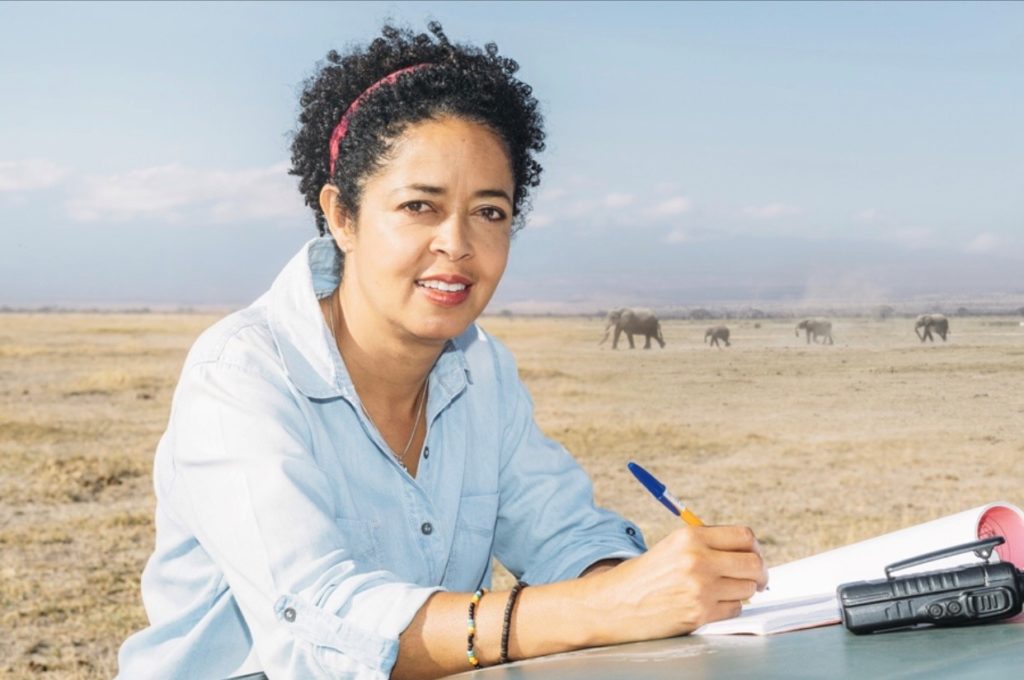
Dr. Paula Kahumbu
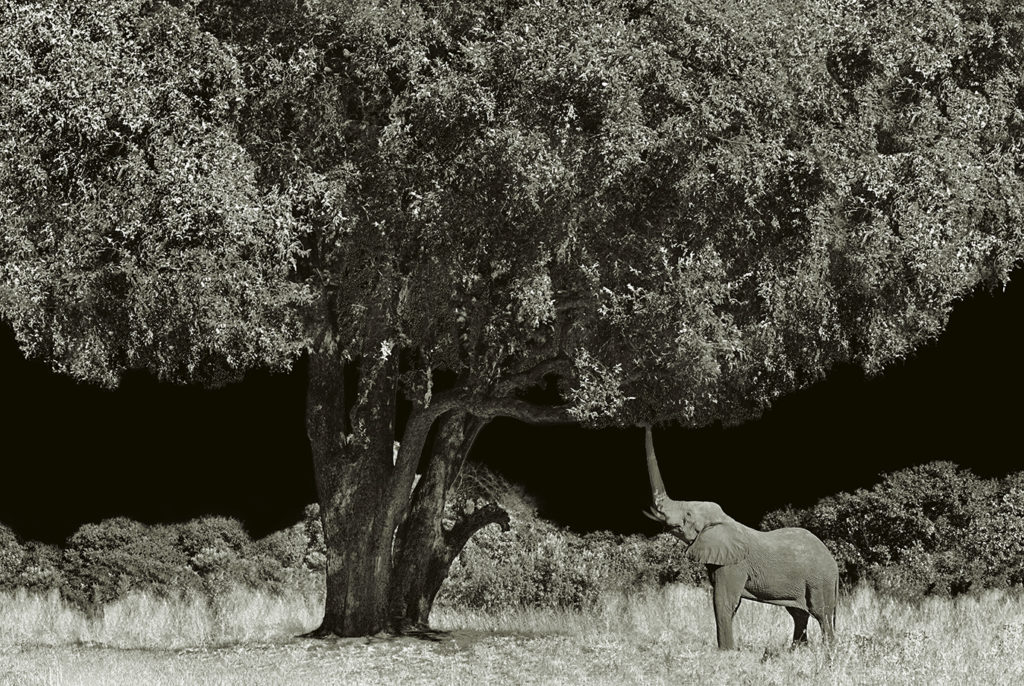
An elephant eating from the Marula tree. Photo by Mark Lakin, photographer and Co-Founder of the luxury travel company Epic Road. Photo available for purchase at www.MarkLakin.com, with a portion of the proceeds going to WildlifeDirect.
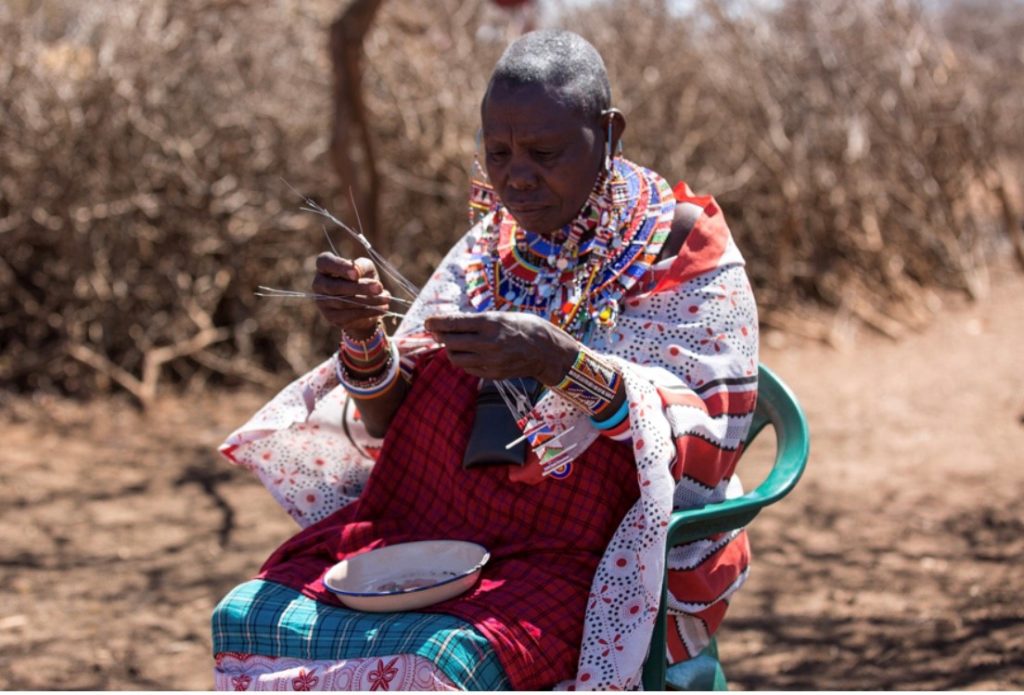
A Maasai woman creating beadwork.
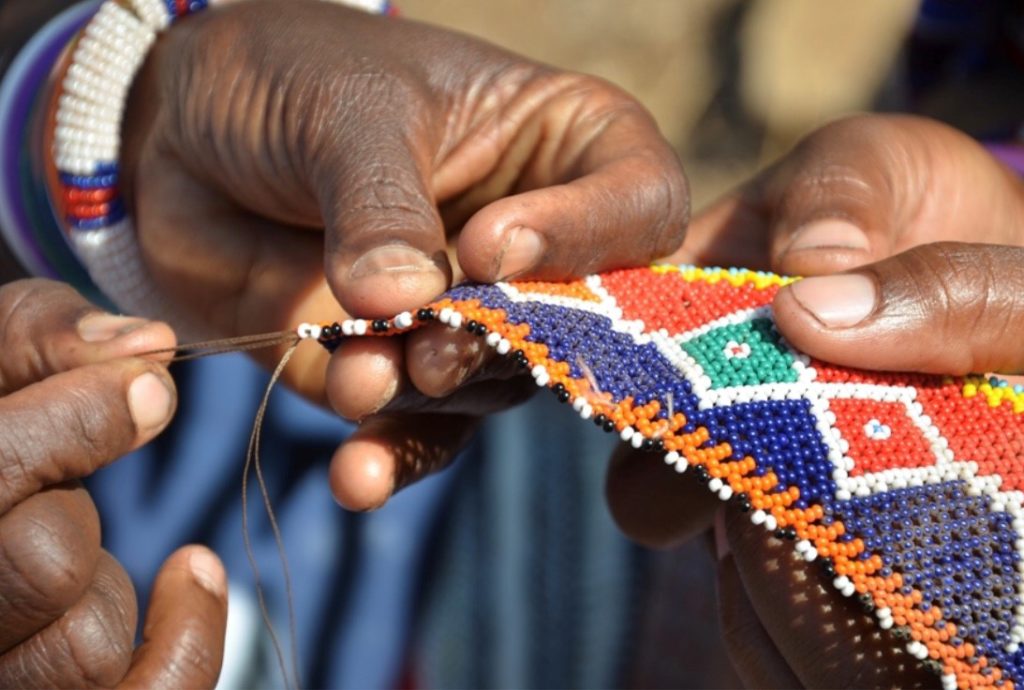
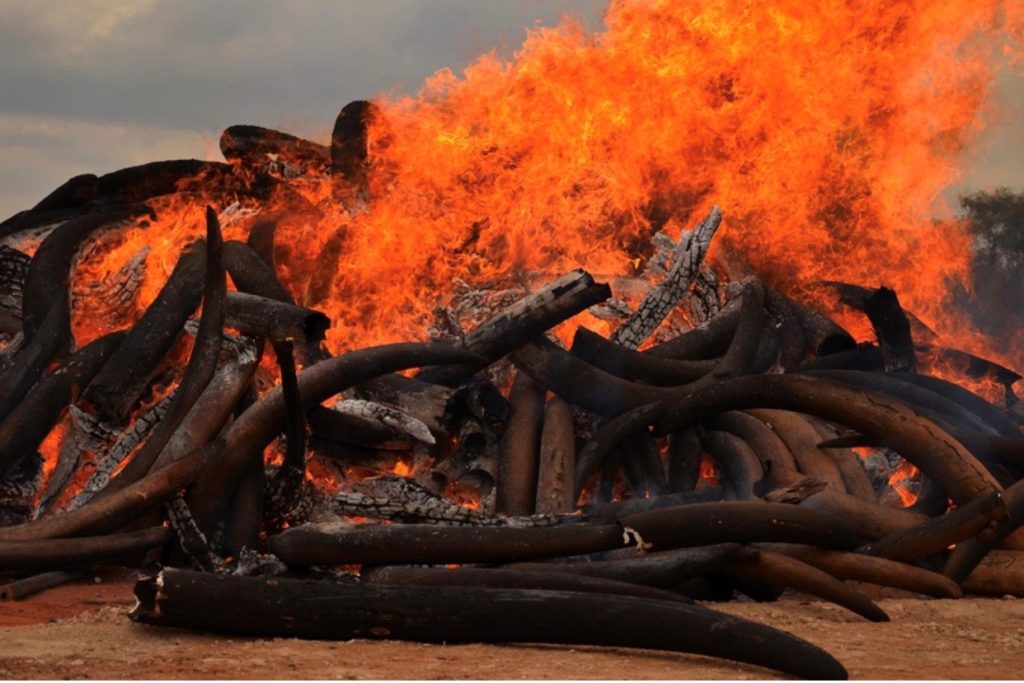
An ivory burn. #lightafire
